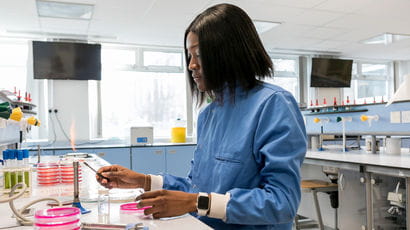The role of gut microbiota in regulating tumour cell metabolism and malignant progression
Introduction
An opportunity to apply for a full-time PhD in the College of Health, Science and Society.
The studentship will be funded by the UWE Bristol Wallscourt Foundation: Ref: 2425-OCT-CHSS03
The expected start date of this studentship is 1 October 2024.
The closing date for applications is 31 May 2024.
About the studentship
Colorectal cancer causes over 900,000 deaths per year worldwide. By 2040 incidence is predicted to rise by a further 50% and the disease is becoming progressively more prevalent in younger people. These tumours can take decades to develop from polyps (which are benign tumours present in 40% of people over 50) into cancer, rendering this a long-term illness that often goes undetected until too late.
The reason that some tumours progress whilst others do not is unclear, but is thought to be determined by their microenvironment, including dietary factors and the gut microbiota. Our recently published work shows that gut microbes interact differently with benign and malignant tumour cells yet can elicit tumour-promoting effects in both. This unique in vitro model of tumour progression allows us to study factors that can influence progression towards malignant, and therefore life-affecting, disease.
Metabolic alteration (including the “Warburg effect”) is an essential adaptive characteristic of tumour cells and recognised as one of the “Hallmarks of cancer.” This adaptive process is necessary for tumours to progress to malignancy enabling cell survival in stress conditions where oxygen and nutrients may be more limiting. This study will determine how specific bacteria (and their metabolites) can affect the progression of colorectal cancer by altering tumour cell metabolism at both the benign and malignant stages of disease.
The proposed project will entail comparing the metabolic responses of both benign and malignant colorectal tumour cells using an Agilent Seahorse analyser. These will assessed in response to both direct microbial infection and secreted microbial metabolites.
In order to determine the molecular mechanism of tumour cell response, activation of key metabolic regulators will be assessed using standard molecular biology techniques.
To better understand how various gut microbes may influence tumour cell behaviour, secreted microbial metabolites will be profiled using mass spectrometry-based metabolomics approaches.
This data could allow the development of countermeasures for cancer prevention and methodologies for the early detection of tumours. Collectively, this will significantly enhance our understanding of how the gut microbiota may accelerate the progression of colorectal tumours.
The student will work with an experienced multi-disciplinary supervisory team.
For an informal discussion about the studentship, please email David Qualtrough at david.qualtrough@uwe.ac.uk.
Funding
The studentship is available from 1 October 2024 for a period of three years, subject to satisfactory progress and includes a tax exempt stipend, which is currently £18,622 per annum for 2023/2024.
In addition, full-time tuition fees will be covered for up to three years for Home and Overseas applicants.
Eligibility
Applicants must have at least a 2:1 or equivalent degree in Biomedical Science, Molecular or Biological Science or a related discipline and ideally will have or be working towards a postgraduate, research-based qualification (or equivalent experience).
Experience of techniques involving mammalian cell culture, microbiology, molecular biology and/or metabolomics would be an advantage.
International students are required to have IELTS 7.0 or above.
A recognised English language qualification is required.
How to apply
Please submit your application online. When prompted use the reference number 2425-OCT-CHSS03
Supporting documentation: you will need to upload your research proposal, all your degree certificates and transcripts and your proof of English language proficiency as attachments to your application so please have these available when you complete the application form.
References: you will need to provide details of two referees as part of your application. At least one referee must be an academic referee from the institution that conferred your highest degree. Your referee will be asked for a reference at the time you submit your application, so please ensure that your nominated referees are willing and able to provide references within 14 days of your application being submitted.
Further information
Interviews will take place in the week commencing 17th June 2024. If you have not heard from us by Week of 14th July 2024, we thank you for your application but on this occasion you have not been successful.
You may also be interested in

Contact the Doctoral Academy
Ways to contact the Doctoral Academy, from postgraduate research support to submitting your thesis.

Fees and funding
View Doctoral Academy tuition fees, project fees, completion fees and resubmission fees.

About the Doctoral Academy
Find out more about the UWE Bristol Doctoral Academy.

Research
Discover how research at UWE Bristol is making a real impact.
